Josh Kennedy opens up on captaincy, family, leaving Hawthorn and the Kennedy name
JOSH Kennedy opens up on his love of the game, leaving the Hawks, surfing at Bondi, club over family, a Colombian wife and the pressure of the Kennedy name.

THE Kennedys. A name intrinsically linked to American politics … and Australian Rules Football. It’s a name that is worshipped at the Hawthorn Football Club.
Josh Kennedy’s grandfather coached the Hawks to their first premiership, and his father won four as a player. Josh started his career at the Hawks, moved to the Swans, has won a flag, and is now their skipper.
We spoke through the Swisse Series about his love of the game, leaving the Hawks, surfing at Bondi, club over family, a Colombian wife, the pressure of the Kennedy name and the happiness of his son.
HAMISH McLACHLAN: Shall we leave the sluggish start to the season alone?
JOSH KENNEDY: I’m happy to …
HM: OK. A more holistic chat then; that’ll work. What do you love most about footy?
JK: Ummm … I think what I love most is how it’s always brought people together. I love it because you can be six foot six and weigh 110kg, or be five foot eight and weigh 75kg, and you can still have the same impact on a game. There’s not many sports in the world like that. It’s very unique.
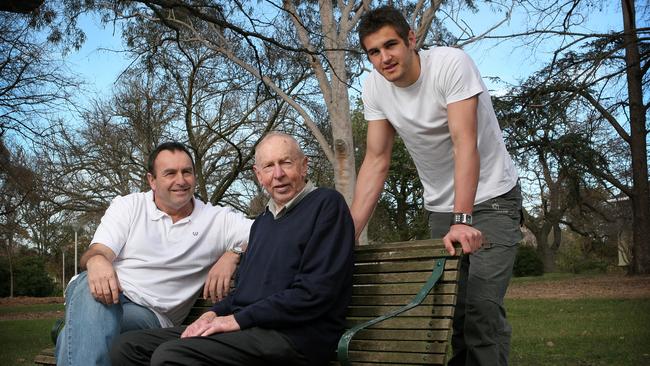
HM: Your earliest footy memory?
JK: It’s getting knocked around the living room by my older cousins, Matthew and Luke Ball. It used to be me versus the two of them. It was so much fun. And I remember heading off to the games with my brothers, and going out to Waverley to watch the Hawks. I just loved the atmosphere of the game — it was all a bit magical to me.
HM: Is it still?
JK: It is, but it is probably a different, a different kind of love, because there is so much more to it. It’s now an endless pursuit of trying to get better, and striving to win, so much so that there’s very little time for enjoyment. It’s nice to sit back and reflect on the good moments, whether that be after a big win or a big event during the year, but they are rare. That’ll come in retirement, I hope.
HM: Excluding the 2012 Grand Final win, is there a moment you most savour in your career?
JK: I think preliminary finals are fantastic. The one that stands out the most is the 2012 preliminary final against Collingwood at ANZ Stadium. It was Jude Bolton’s 300th game, and I remember going up to him halfway through the last quarter when the game was pretty much iced, and seeing the look on his face. It’s something I’ll never forget. The feeling of knowing that I was going to play in my first ever Grand Final … when I think about that, I feel absolute happiness.
HM: A sense of relief to have got to the last game?
JK: It is pure joy after winning the prelim. It’s different after a Grand Final … your first emotion is simply relief. It’s a build-up of everything you’ve done to get to that point, and to have finally won, it brings out a huge sense of relief.
HM: You would have dreamt about that moment all your life. You’re from a famous football family that has won grand finals ... that’s what the Kennedys seem to do. When you actually achieve it, is it as real and as vivid and brilliant as you imagined it would be?
JK: Yeah, absolutely, maybe even more powerful. When you hear the final siren, and you’re in front, you then get to see all the joy on your teammates’ faces as well as the faces of family and friends and your fans — it is just an incredible feeling. The feeling you get from winning the last game of the season is what drives you to try and get back there again.
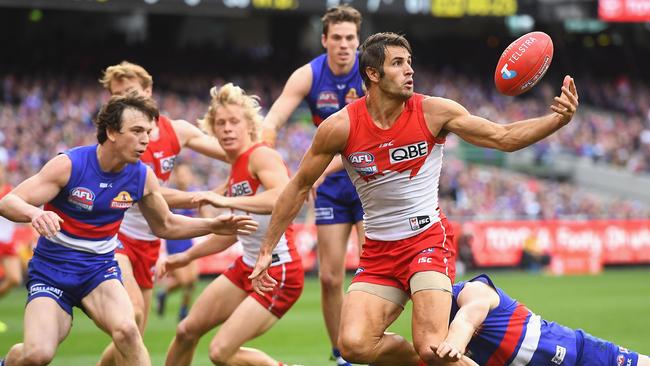
HM: The Kennedy name is so intrinsically linked to football. Your grandfather was the first Hawthorn premiership coach, and your father won four flags as a player. Did you feel a sense of pressure when you arrived?
JK: No, surprisingly; I never did at all, to be honest. There may have been external expectations, but internally I’ve always seen it as a blessing, and I feel really fortunate that I’ve got a number of people within my immediate family and extended network that I can rely for advice and guidance through difficult times, because most of them have been there and experienced it before.
HM: How much of an influence have John Sr and John Jr had on your career?
JK: My dad has been, and is undoubtedly my biggest influence, and my biggest mentor. On top of that I’d say my cousins Matt and Luke Ball, as well as my family there at Hawthorn. I was fortunate to play with some fantastic players and leaders in Sam Mitchell, Luke Hodge and Jordan Lewis who all taught me a lot. I feel like I’m a good learner, so I seek these guys out and try and learn about what they do so I can better myself. When I came to Sydney there was Brett Kirk, Adam Goodes, Jude Bolton, Jarrad McVeigh. They were all at the top of their game, and all so unselfish when it came to giving their time and knowledge to me.
HM: Fact or myth: John Kennedy Sr was barracking for Hawthorn in 2012 in the Grand Final?
JK: I think that’s fact. He would have wanted Hawthorn to win, for sure.
HM: Over his grandson winning?
JK: I think so. He absolutely wanted me to do well and play at my best, but I think that his love of Hawthorn is so strong that it was club first, grandson second.
HM: You went to Sydney after 13 games with the Hawks. You’ve played seven seasons, won three best-and-fairests, never been outside the top three, and been named captain. Did you think your career was about to flourish, regardless of where you were, or did something just click with Sydney?
JK: I think probably the latter. I felt really rejuvenated moving up to Sydney, and I instantly really felt like I was a part of the team. I felt like I was given time for my confidence and abilities to grow, and I regained my love for the game and for the team environment as well.
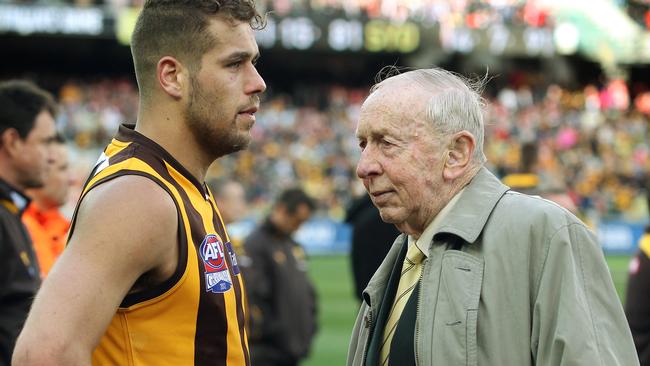
HM: Had you lost it a little?
JK: I think I had. It’s pretty tough playing every week in the reserves. You obviously want to play well and you want the team to do well, but you’re really only there because you want to be playing at the highest level. That team aspect surrounding it was probably lost a little bit on me, but I certainly regained that when I came to Sydney.
HM: You live in Bondi. How’s your surfing coming along?
JK: I took it up a few years ago before Emilio was born, and if you ask any of the boys at the club, they’ll say that I never really took it up and never got a hold of it. I like to think I can stand up and catch a wave every now and then, but over the last few years it’s certainly taken the back seat!
HM: Do you think Sydney is a great lifestyle for an AFL player? It’s a bit of a fish bowl in Melbourne, and in Adelaide and Perth where the two-team town is ferocious. Does Sydney work for you?
JK: Absolutely. I’m incredibly fortunate to be able to train and play in Sydney, and then go home to the beach. The people have always been very respectful, and there’s not a lot of media scrutiny. It’s a real shock now when I come down to Melbourne. It was a shock going to Sydney initially when I realised how little AFL was talked about, and now it’s a shock going to Melbourne, Perth or Adelaide and seeing how much it means to the people there. I think we have the best of both worlds.
HM: You started as a single young man at Hawthorn, and now you’re married and a father of one. Has having your own family helped your footy?
JK: Absolutely. Having a family certainly gives you perspective in terms of the wins and losses, but it also gives you motivation because you want to win more and you want to make them proud. You want to create a legacy for yourself and something that your son can be proud of when he thinks of his dad, and that’s certainly something that is a driving force for me. It doesn’t put any added pressure on, but it certainly helps me motivate.
HM: Do you enjoy being a father more than you thought you would?
JK: Well, it all happened pretty quickly, Hame. I haven’t had too much time to think about it, but it’s certainly been challenging. My wife, Ana, doesn’t have family in Sydney, and my family are in Melbourne, so she’s done a mountain of work and been a terrific mum. She’s supported me doing things that I need to do to make sure that I’m still able to play at my best, and be physically and mentally prepared. I’ve absolutely enjoyed the journey and the time has flown; he’s two now! It’s been amazing watching him grow up and seeing the changes in him each day. He’s starting to get more into what I’m doing and more into the footy, and that gives me a great sense of pride and amazement that here’s here and he’s mine.
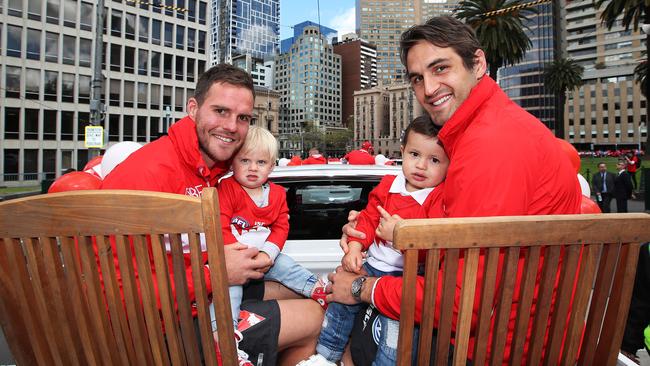
HM: How did the sleep patterns change with the youngster? Some people stay in hotels the night before a game or sleep in different rooms; did it upset you?
JK: No, it didn’t really. As I said, Ana’s been fantastic and very understanding. There’s times where we tried to work out a routine that suited, but eventually you just find a way to get through it. It is challenging, but there’s more people that go through far more difficult circumstances than what we have, and I like to think it helps you grow as a person. I’m certainly not as hung up on intricacies in preparation or making sure I need to get a good night’s sleep, because as you’d know if you have a young child, things can change pretty quickly! You just have to learn to roll with the punches, and, for me, I think that’s probably helped my preparation in terms of being a bit more relaxed and just letting things play out the way they are meant to.
HM: Your wife, Ana, is Colombian and she is heading home for two months during the footy season. You’re going to be solo. I’m worried about your eating habits falling a little!
JK: Well, I was solo for a few years prior to meeting Ana, which should hold me in good stead. I might have to fly Mum up for a week or two to help me out! It’s going to be an interesting time. She has been away before, it’s part of our relationship and having her family so far away. Two months will be a long time, but I’m just happy that she’s happy, and I’m sure I will be able to focus on what I need to do here. I can’t wait to see him when he gets back, and see how much he’s changed. I’m sure it will go pretty quick.
HM: Emilio will return speaking fluent Spanish?
JK: I hope so! I wish someone could have taught me when I was two years old how to speak a different language — it’s an incredible gift.
HM: Ana is looking after the Spanish. What are you hoping to teach him other than a perfect drop punt?
JK: That’s a great question, and I probably haven’t thought enough about it, to be honest. I think you just trust that you’re doing the right thing. It’s very important to set a good example. In terms of one defining characteristic, certainly respect, and maybe determination to seek out what he wants will be what I encourage.
HM: The best advice you’ve been given, and from who?
JK: Always say please and thank you. I will never forget that. Mum told me that at a young age, and it’s held me in good stead.
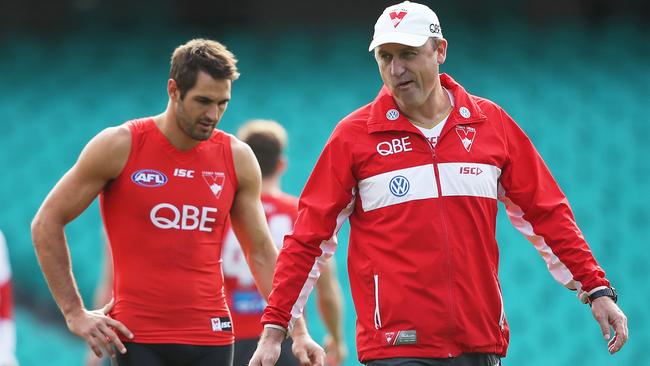
HM: So much time is spent on getting your body right each week — how do you get your mind right week by week? Do you focus much on mindfulness?
JK: Yeah, it’s certainly a big thing at the moment that’s being explored by a lot of the players. I’ve certainly explored it, and I think it’s a necessary skill to be able to switch on and switch off, to get in the zone when required. It’s just about having a balanced lifestyle and being able to train with intensity, but also remembering that it’s important to relax. Whether that be spending time with the family, or heading out for a walk or a dinner, it’s important to be present in whatever you’re doing. I’ve got a lot better at it — switching off, and on, depending on the environment.
HM: Full-time footballer or part-time footballer. Which do you think you would prefer in 2017?
JK: There’s a lot of positives we get from the game these days, and we are in a far greater financial state to set up our future compared to what my dad was. With that comes a lot more scrutiny, and a lot more pressure each week; there are more cameras. There are positives and negatives to come out of both ends of the spectrum, but we are incredibly fortunate to get paid well to play the game we love.
HM: Being captain of an AFL club is something a lot of us dream of, and few get to do. I assume it was John (Longmire) who asked you whether you wanted to be captain?
JK: It was actually Jarrad McVeigh that spoke to me prior to John letting me know. There was going to be a change, but he was supportive of it and he was very supportive of me. He said that I should give it some serious thought, and then John approached me with Kieran Jack and basically put it to me. It’s then that you start asking yourself if you are the right man for the job. They basically said: “We support you, we will give you a couple of days to think about it, but you know where we’re looking for a bit of a change, and you’re the man we think can achieve it”.
HM: Any hesitation?
JK: There was no hesitation. I certainly didn’t take it lightly though, and immediately I wanted to speak to a few different people to get their opinions, because it’s more than just a job. It takes a lot of responsibility and a lot of commitment. You have to be mentally prepared for it, it’s not something that I just wanted to jump into, but I did feel like I was prepared. I had the conversation with Ana and the family to make sure everyone was on board, because it’s not something that I think you can put in the trophy cabinet. Yeah, it’s a tough job and a big responsibility, but it was a challenge I looked forward to.
HM: When you approached Ana and Emilio about your captaincy, what did Emilio say?
JK: Vamos!
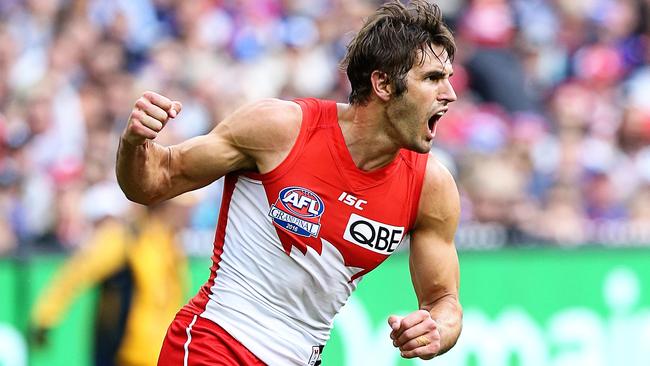
HM: Great leaders: what do you think they’ve all got?
JK: That’s a good question. It’s a question that’s really difficult to answer because I think everyone has their own leadership style. It’s an evolving role, and even now there’s still things that I’m certainly not great at. There’s things I need to work on as a leader and as a captain, so in regards to the key attributes, I’m not 100 per cent sure what they are. The fact is that I feel confident in myself. I’m confident with the playing group that we have, and I’m willing to learn and try to get better as a leader. Every day I’m thinking of ways that we can get better as a team, and I think that is the main thing. I’m fortunate that I’ve played under some great captains. I’ve got no shortage of guys to talk to about it with at the swans, whether that be in the playing group and beyond, in the coaching staff or support staff.
HM: You say there is stuff you need to work on. What do you think the most challenging part of being captain is?
JK: The most challenging part is trying to build great relationships with all 45 players on the list. It’s not an easy thing to do when you’re so focused on your own preparation, and above that probably the preparation of the 25-27 guys that are in line to be playing and going to get you over the line for a win, so trying to develop those relationships with the whole list is something that can be hard. That’s something that I need to work on as an individual, and make sure that everyone in the team knows that they have my support and backing.
HM: You almost ran the AFL CEO over after the Bruce Springsteen concert, as he was jaywalking on his way home. If you were CEO of the AFL for a day, what’s the one thing you would have a look at? What would you put on top of the to-do list?
JK: I’m not sure I would want the job to be honest — even for a day. It’s pretty thankless! I think the game is in a pretty good spot at the moment. One thing I would put on top of the list is to just try and calm everyone down on all the speculation and chat and negativity. We should be so thankful for what we have. We don’t need to change too much. A lot of people talk about too many stoppages, or the tackling rule, or the deliberate, or how we want to make the game more free flowing, but people have told me the 2016 grand final was one of the most fantastic games of footy they’d ever seen. It’s a competitive game, it’s combative, and as we mentioned at the start it involves all different shapes and sizes. It’s a good product, and we don’t need to change it too much. Stop knocking it, just enjoy it.
HM: Grand final start time in your ideal world?
JK: I’m happy with how it is. From a players’ perspective, I wouldn’t want too much of the day to think about it. I like just being able to wake up, have breakfast, do what you need to do and then head off to the ground. From a spectator point of view, I can understand the interest in having a twilight game or a night game. I think that’d be pretty special, but from a player’s point of view, I think being able to play at 2 o’clock and then enjoying the aftermath, if you were to win, is fantastic.
HM: Unlimited budget. Who do you engage for halftime entertainment?
JK: I’d get Coldplay. I’ve seen them live a couple of times before, and they’re just a crowd-pleaser all round. They tick every box, and I think everyone in the crowd no matter how old, would love it.
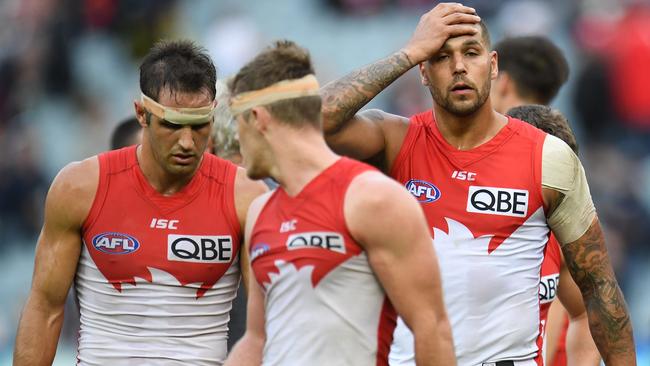
HM: Josh Kennedy’s top 50 players in the AFL: who would be one?
JK: Going into the season this year, it would have to have been Paddy Dangerfield.
HM: Where would you have yourself?
JK: I’m not too sure. I’d have myself on par with a few of my teammates; I’d like to think we are a good team.
HM: It’s a very captain-like response.
JK: It’s an honest response, though.
HM: Where would you put Nat Fyfe?
JK: Right at the very pointy end.
HM: What makes you happiest?
JK: In a football sense or generally?
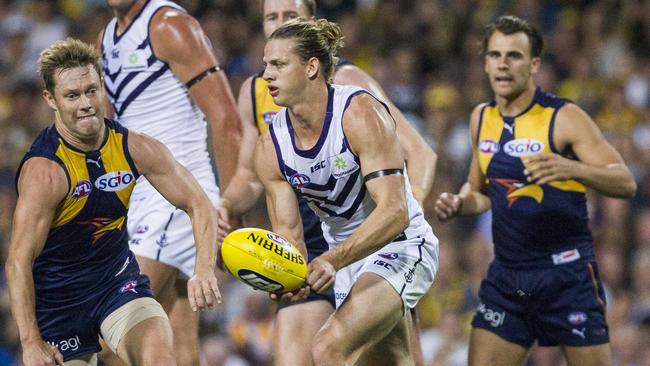
HM: Life.
JK: I take great happiness in seeing my friends and my family happy and healthy and enjoying their lives. If they’re happy — particularly Ana and Emilio — so am I. On a personal front, I take a lot of pride in being able to set certain goals and achieve them if I can, but I think mostly just seeing the people that I love most well and happy makes me happiest. Emilio’s only two at the moment, so he’s generally pretty happy most of the time. I’d love him to stay like that, but the more that I talk to people who have been through that stage, I slowly begin to realise that it’s not going to be the case forever. As you said, you’re trying to do everything you can to give your kids happiness and give them the opportunities to flourish. That’s certainly what I will be striving to do.
HM: Last time you cried?
JK: After the 2016 Grand Final.
HM: In the rooms or on the ground?
JK: It was on the ground. I was shattered, I couldn’t help it.
HM: You’re on social media. Would you recommend it to the younger players?
JK: That’s a good question. If you could, you would probably prefer to try and keep your distance from it. That’s a bit hypocritical, because I have social media, but it can be pretty brutal.
HM: Do you get affected by the criticism?
JK: No, not yet, anyway. To be fair, I think the benefit of living up in Sydney is that we are sheltered from it a lot. I feel for a lot of the guys down in Melbourne that are constantly getting criticised; I think that would be tremendously difficult. It’s just a part of the business that is the AFL, but you can’t fight it and you can’t hide from it. There’s a lot of positives to be taken out of it as well, in terms of all the marketing teams and brands and everyone that wants to be associated with you. Social media is a way to engage with the fans, and you need to be taught early on how to deal with it and how to manage it.
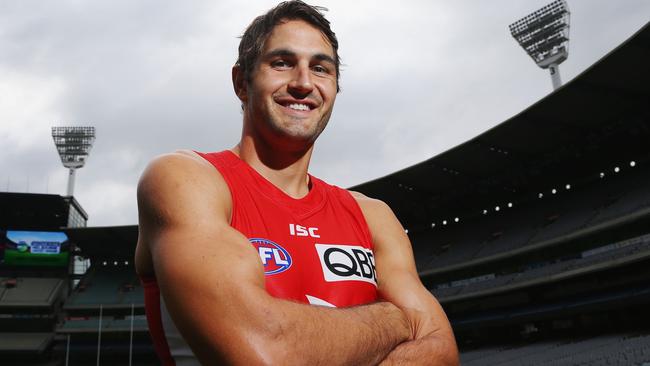
HM: When you’re trying to find ways better yourself, what are the things you’ve done to try and get an extra 1 or 2 per cent?
JK: By learning from your teammates, or from opposition players, about things they might be doing, whether it be on how they train, or their diet. We spoke earlier about mindfulness and meditation and visualisation; these are things that are sweeping the sporting world at the moment, and I think it will continue to in a big way. In the system it’s a never-ending pursuit of trying to be better yourself, and I guess trying to find that extra 1 or 2 per cent. It’s in everything that you’re doing at home or at the football club, and sometimes it’s important to remember that sometimes to do more you have to do less. It’s just being aware; it’s more a mindset, and I think if you have that mindset of wanting to be better, then those 1 per cents will come.
HM: Do you look at a guy like Roger Federer and learn from what you see?
JK: Federer’s obviously in a league of his own, and one of my most favourite sportsmen ever. His calmness and composure in huge moments is what I admire. I would love to be able to pick his brain. I’ll wait for him to write a book — I’ll certainly be buying it and trying to dissect any little intricacies or hints that he refers to in terms of elite performance. Tom Brady is another one. A lot has been said about how he prepares in his diet, and he’s referred a few books. One of them was The Inner Game of Tennis, which talks about the mental approach of tennis, but that can obviously be applied to a lot of different sports, so I will be seeking that out. It’s important to try and get any advantage I can, and learn from the best.
HM: Recommend me a book?
JK: I can’t think past the last one I’ve read, which was Paul O’Connell’s book The Battle. He was captain of the Ireland rugby team.
HM: What were the lessons from it?
JK: He was a fantastic player, and he was a tremendous leader. He was an uncompromising leader in the way he went about it, setting the standards himself with the way that he prepared, and demanding it from others.
HM: You’re 28 now. What advice would you give a 14-year-old Josh Kennedy?
JK: I’d tell a young me that life’s about balance. I was very fortunate when I came through the ranks that I didn’t feel any pressure to have to play AFL or to pursue it as a career, I did it because I wanted to play. That’s important. I would tell my younger self to give everything you’ve got in pursuit of your career, and give absolutely everything you have to try and get better, but either way, it’s not the be-all and end-all. I’ve got friends who didn’t get drafted, and they thought at the time it was the be-all and end-all, but you speak to them now and everything works out as long as you have the commitment to be successful in anything you do. Enjoy life and enjoy the little things. Enjoy your friends and family because at the end of the day, they’re the most important people. The most important thing in your life is to make sure you enjoy those times, because we can never get them back — as we know.
HM: Great advice. I hope you’re enjoying it all.
JK: I enjoyed talking — thanks, Hame.




